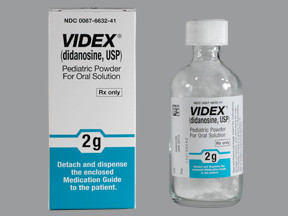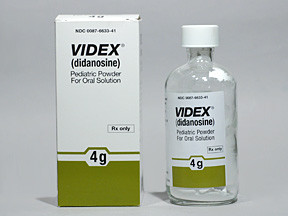DIDANOSINE (DDI) SOLUTION - ORAL
PHONETIC PRONUNCIATION: (dye-DAN-oh-seen)
COMMON BRAND NAME(S): Videx
GENERIC NAME(S): didanosine
Uses
USES: This drug is used with other HIV medications to help control HIV infection. It helps to decrease the amount of HIV in your body so your immune system can work better. This lowers your chance of getting HIV complications (such as new infections, cancer) and improves your quality of life. Didanosine belongs to a class of drugs known as nucleoside reverse transcriptase inhibitors-NRTI. Didanosine is not a cure for HIV infection. To decrease your risk of spreading HIV disease to others, do all of the following: (1) continue to take all HIV medications exactly as prescribed by your doctor, (2) always use an effective barrier method (latex or polyurethane condoms/dental dams) during all sexual activity, and (3) do not share personal items (such as needles/syringes, toothbrushes, and razors) that may have contacted blood or other body fluids. Consult your doctor or pharmacist for more details.
How to use DIDANOSINE (DDI) SOLUTION - ORAL
HOW TO USE: Read the Medication Guide provided by your pharmacist before you start using didanosine and each time you get a refill. If you have any questions, ask your doctor or pharmacist. Take this medication by mouth usually 1-2 times a day on an empty stomach, at least 30 minutes before or 2 hours after a meal, or as directed by your doctor. Shake the bottle well before measuring each dose. Carefully measure the dose using a special measuring device/spoon. Do not use a household spoon because you may not get the correct dose. Didanosine solution is mixed by your pharmacist with an antacid to form a suspension. The antacid can interfere with your body's ability to absorb certain drugs, especially if you take them around the same time. These drugs include quinolone antibiotics (such as ciprofloxacin, levofloxacin), tetracycline antibiotics (such as doxycycline, minocycline), levodopa, thyroid medications (such as levothyroxine), azole antifungals (such as ketoconazole, itraconazole), and drugs for osteoporosis (bisphosphonates such as alendronate). This is not a complete list. Consult with your pharmacist how long you must wait between doses of your other medications and didanosine solution. Do not take other antacids or acid-lowering drugs (such as cimetidine, omeprazole, ranitidine) with this product without talking with your doctor first. The dosage is based on your weight, medical condition, and response to treatment. It is very important to continue taking this medication (and other HIV medications) exactly as prescribed by your doctor. Do not skip any doses. Do not increase your dose, take this drug more often than prescribed, or stop taking it (or other HIV medicines) even for a short time unless directed to do so by your doctor. Skipping or changing your dose without approval from your doctor may cause the amount of virus to increase, make the infection more difficult to treat (resistant), or worsen side effects. For the best effect, take this medication at evenly spaced times. To help you remember, take this medication at the same time(s) every day.
Side Effects
Precautions
Interactions
Overdose
Images
Reviews
Faq for DIDANOSINE (DDI) SOLUTION - ORAL
Didanosine (DDI) solution is an antiviral medication that is used in combination with other drugs to treat HIV infection.
Didanosine (DDI) works by inhibiting the replication of the HIV virus, thereby slowing down the progression of the disease.
Common side effects of Didanosine (DDI) solution may include diarrhea, nausea, stomach pain, headache, rash, and tingling or numbness in the hands or feet.
Didanosine (DDI) solution should be taken on an empty stomach, at least 30 minutes before or 2 hours after a meal. It is usually taken once daily or as directed by your doctor.
Before taking Didanosine (DDI) solution, you should inform your doctor about all the medications you are currently taking, including prescription drugs, over-the-counter medications, and herbal supplements. Some medications may interact with Didanosine (DDI) solution and affect its effectiveness or increase the risk of side effects.
If you miss a dose of Didanosine (DDI) solution, take it as soon as you remember. However, if it is almost time for your next dose, skip the missed dose and continue with your regular dosing schedule. Do not double the dose to make up for a missed one.
Didanosine (DDI) solution is not a cure for HIV infection. It helps to control the virus, reduce the symptoms, and improve the quality of life for people living with HIV.
It is generally recommended to avoid alcohol consumption while taking Didanosine (DDI) solution, as it may increase the risk of certain side effects, such as liver damage.
It is not recommended to breastfeed while taking Didanosine (DDI) solution, as the medication can pass into breast milk.
Warning
WARNING: Rarely, didanosine has caused a severe (sometimes fatal) pancreas problem (pancreatitis) when used alone or with other HIV medicines. Immediately tell your doctor if you develop symptoms of pancreatitis (persistent nausea/vomiting, stomach/abdominal/back pain). Rarely, didanosine has caused a severe (sometimes fatal) liver and blood problem (lactic acidosis). These problems may be more likely in females or people who are overweight (obese). Immediately tell your doctor if you develop symptoms of liver problems (persistent nausea, stomach/abdominal pain, dark urine, yellowing eyes/skin) or lactic acidosis (rapid breathing, drowsiness, muscle aches, severe weakness). Didanosine should not be used with a certain HIV medicine, stavudine, due to increased risk of these serious side effects.
Disclaimer
IMPORTANT: HOW TO USE THIS INFORMATION: This is a summary and does NOT have all possible information about this product. This information does not assure that this product is safe, effective, or appropriate for you. This information is not individual medical advice and does not substitute for the advice of your health care professional. Always ask your health care professional for complete information about this product and your specific health needs.


No Reviews Yet